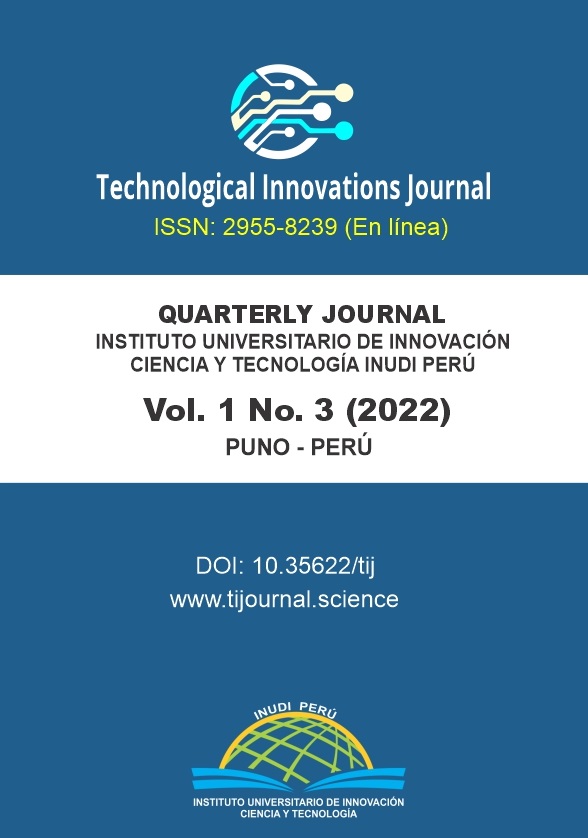Estudo empírico para determinar a relação entre a personalidade de programadores iniciantes e a programação colaborativa em tempos de pandemia
DOI:
https://doi.org/10.35622/j.ti.2022.03.002Palavras-chave:
habilidades, pensamento computacional, programação colaborativa, traços de personalidadeResumo
Tradicionalmente, as atividades de ensino-aprendizagem nas escolas na maioria dos estados da República Mexicana eram interações presenciais entre alunos e professores, mas obviamente no período da pandemia do COVID-SARS-COV-2 tudo mudou no contexto educacional. Porque o uso da videoconferência foi ganhando espaço no meio acadêmico, adaptando-se de várias maneiras no processo de ensino-aprendizagem, é o caso da programação colaborativa remota onde tanto habilidades sociais quanto cognitivas devem ser desenvolvidas. Neste trabalho, um estudo empírico foi desenvolvido em uma amostra não probabilística de 21 estudantes durante um período de 14 semanas na Universidade Politécnica de Tulancingo, Hidalgo, México, a fim de identificar se traços de personalidade e gênero influenciaram a adoção da programação a distância habilidades de trabalho em quatro fatores: negociação, funcionalidade da equipe, construção de conhecimento em grupo e programação colaborativa.
Referências
Beck, L., & Chizhik, A. (2013). Cooperative Learning Instructional Methods for CSI: Design, Implementation, and Evaluation. ACM Transaction on Computing Education, 13(3). DOI: https://doi.org/10.1145/2492686
Boslaugh, S. (2012). Statistics in a nutshell. O' Reilly Media, Inc.
Bravo, C., Duque, R., & Gallardo, J. (2013). A groupware system to support collaborative programming: Design and experiences. Journal of System and Software, 86(7), 1759-1771. DOI: https://doi.org/10.1016/j.jss.2012.08.039
Clark, L. A., & Watson, D. (1999). Temperament: A new paradigm for trait psychology. Handbook of personality: Theory and Research, 2, 399-423.
Costa, P. T., & McCrae, R. R. (1992). Normaly personality assessment in clininal practice: The NEO Personality Inventory (Vol. 4). Psychological assessment. DOI: https://doi.org/10.1037//1040-3590.4.1.5
De Hei, M., Strijbos, J., Sjoer, E., & Admiraal, W. (2015). Collaborative Learning in Higher Educational: Lecturers Practices and Beliefs. Research Papers in Education, 30(2), 232-247. DOI: https://doi.org/10.1080/02671522.2014.908407
Demier, Ö., & Seferoglu, S. S. (2021). The efect of determining pair programming groups according to various individual difference variables on group compatibility, flow and coding. Journal Computing Research, 59(1), 41-70. DOI: https://doi.org/10.1177/0735633120949787
Denner, J., Werner, L., Campe, S., & Ortiz, E. (2014). Pair Programming: Under What Conditions is ti Advantageous for Middle School Students? Journal of Research on Technology in Education, 46(3), 277-269. DOI: https://doi.org/10.1080/15391523.2014.888272
E. R., C., R. H., C., & Sosa, L. (2021). Use of Techno-Pedagogical Tools to Incorporate Remote Collaboration in a Data Structure Course. En IEEE (Ed.), International Conference in Software Engineering Research and Innovation, (págs. 232-237). DOI: https://doi.org/10.1109/CONISOFT52520.2021.00039
Fiore, S. (2017). Collaborative Problem Solving Considerations for the National Assesment of Educational Progress. National Center for Education Statistics, United State Department of Education. Washintong DC.
Funke, J. (2010). Complex problem solving: A case for complex cognition? Cognitive Processes, 11, 133-142. DOI: https://doi.org/10.1007/s10339-009-0345-0
Galdo, A. C., Celepkolu, M., Lytle, N., & Boyer, K. E. (2022). Pair Programming in a Pandemic: Understanding Middle School Students' Remote Collaboration Experiences. In Proceedings of the 53rd ACM Technical Symposium on Computer Science Education, 1, págs. 335-341. DOI: https://doi.org/10.1145/3478431.3499324
Garcia, R. (2020). Codification pedagogy for introductory procedural programming course. Doctoral dissertation.
Glaser, R., Linn, R., & Bohrnstedt, G. (1997). Assessment in Transition: Monitoring the Nation´s. National Academy of Education.
Goldberg, L. R. (1999). A broad-bandwith, public domain, personality inventory measuring the lower-level facets of several five-factor models. Personality psychology in Europe, 7(1), 7-28.
Graesser, A. (2018). Assesment and teaching of 21st Century Skills. Research and applications.
Hacker, D., Dunlosky, J., & Graesser, A. (2009). Handbook of metacognition in education. DOI: https://doi.org/10.4324/9780203876428
Huang, J., & Parker, M. C. (2022). Developing computational thinking collaboratively: the nexus of computational practices within small groups. Computer Scince Education, (págs. 1-33). DOI: https://doi.org/10.1080/08993408.2022.2039488
Iqbal, M. A., Ammar, F. A., Aldaihani, A. R., Khan, T. K., & Shah, A. (2019). Building Most Effective Requirements Engineering Teams by Evaluating Their Personality Traits Using Big-Five Assessment Model. IEEE 6th International Conference on Engineering Technologies and Applied Sciences (ICETAS) (págs. 1-5). IEEE. DOI: https://doi.org/10.1109/ICETAS48360.2019.9117561
Judge, T. A., Higgins, C. A., Thoresen, C. J., & Barrick, M. R. (1999). The big five personality trains, general mental ability, and career success across the life span. Personnel Psychology, 53(3), 621-652. DOI: https://doi.org/10.1111/j.1744-6570.1999.tb00174.x
Kafai, Y. B., & Burke, Q. (2013). The Social Turn in K-12 Programming: Moving from Computational Thinking to Computational Participation. Technical Symposium on Computer (ACM). DOI: https://doi.org/10.1145/2445196.2445373
Kish, K., Christian, H., Brent, R., & Alanna, K. (2013). The digital school. Atkearny.
Mayer, E. (2014). Problem solving. The blackwell dictionary of cognitive psychology. Oxford, England: Blackwell.
O´Neil, H. (1999). Perspectives on computer-based performance assessment of problem solving. Computers in Human Behavior, 15(3-4), 255-28. DOI: https://doi.org/10.1016/S0747-5632(99)00022-9
Osinki, M., & Rummel, N. (2019). Towards Successful Knowledge Integration in Online Collaboration: An Experiment on the Role of Meta-Knowledge. Proceedings of the ACM on Human-Computer Interaction 3 (CSCW), 1-17. DOI: https://doi.org/10.1145/3359133
PISA. (2015). Results (Volume V): Collaborative Problem Solving. Organization for Economic Cooperatioin and Development.
Saleem, H., Beaudry, A., & Croteau, A. M. (2011). Antecedents of computer self-efficacy: A study of the role of personality traits and gender. Computers in Human Behavior, 27(5), 1922-193. DOI: https://doi.org/10.1016/j.chb.2011.04.017
Salgado, J. F. (2002). The big five personality dimensions and counterproductive behaviors. International Journal of Selection and Assessment, 10(1-2), 117-125. DOI: https://doi.org/10.1111/1468-2389.00198
Sulea, C., Van Beek, I., Sarbescu, P., Virga, D., & Schaufeli, W. B. (2015). Engagement, boredom, and burnout among students: Basic need satistaction matters more than personality trains (Vol. 42). Learning and Individual Differences. DOI: https://doi.org/10.1016/j.lindif.2015.08.018
Sun, C., Shute, V. J., Stewart, A., & Yonehiro, J. (2020). Towards a generalized competency model of collaborative problem solving. Computers & Education, 143(10). DOI: https://doi.org/10.1016/j.compedu.2019.103672
Swider, B. W., & Zimmerman, R. D. (2010). Born to burnout: A meta-analytic path model of personality, job burnout, and work outcomes. Journal of Vocational Behavior, 76(3), 487-506. DOI: https://doi.org/10.1016/j.jvb.2010.01.003
Teague, D., & Lister, R. (2014). Longitudinal think aloud study of a novice programmer. Australasian Computing Education Conference.
Wang, A., Mittal, A., Brooks, C., & Oney, S. (2019). How Data Scientists Use Computational Notebooks for Real-Time Collaboration. Proceedings of the ACM on Human-Computer Interaction 3. CSCW. DOI: https://doi.org/10.1145/3359141
Wing, J. (2006). Computational thining. Communications of the ACM, 49(3), 33-35. DOI: https://doi.org/10.1145/1118178.1118215
Wu, B., Hu, Y., Rius, A. R., & Wang, M. (2019). Analysing computational thinking in collaborative programming: A quantitative ethnography approach. Journal Computer Assited Learning, 3(53), 421-434. DOI: https://doi.org/10.1111/jcal.12348
Yalagi, P., Rashmi, K., & Manisha, A. N. (2020). Enhanced programming learning model (EPLM) through continuous collaborative coding (CCC) practice. Journal of Engineering Education Transformations, 561-566. DOI: https://doi.org/10.16920/jeet/2020/v33i0/150117
Publicado
Edição
Seção
Licença
Copyright (c) 2022 Carlos Enríquez (Autor/a)

Este trabalho está licenciado sob uma licença Creative Commons Attribution 4.0 International License.











